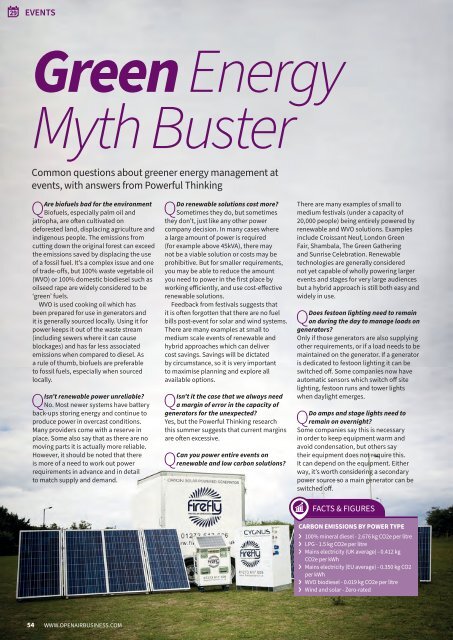Issue 50
The UK's outdoor hospitality business magazine for function venues, glamping, festivals and outdoor events
The UK's outdoor hospitality business magazine for function venues, glamping, festivals and outdoor events
You also want an ePaper? Increase the reach of your titles
YUMPU automatically turns print PDFs into web optimized ePapers that Google loves.
EVENTS<br />
Green Energy<br />
Myth Buster<br />
Common questions about greener energy management at<br />
events, with answers from Powerful Thinking<br />
Are biofuels bad for the environment<br />
Q Biofuels, especially palm oil and<br />
jatropha, are often cultivated on<br />
deforested land, displacing agriculture and<br />
indigenous people. The emissions from<br />
cutting down the original forest can exceed<br />
the emissions saved by displacing the use<br />
of a fossil fuel. It’s a complex issue and one<br />
of trade-offs, but 100% waste vegetable oil<br />
(WVO) or 100% domestic biodiesel such as<br />
oilseed rape are widely considered to be<br />
‘green’ fuels.<br />
WVO is used cooking oil which has<br />
been prepared for use in generators and<br />
it is generally sourced locally. Using it for<br />
power keeps it out of the waste stream<br />
(including sewers where it can cause<br />
blockages) and has far less associated<br />
emissions when compared to diesel. As<br />
a rule of thumb, biofuels are preferable<br />
to fossil fuels, especially when sourced<br />
locally.<br />
Isn’t renewable power unreliable?<br />
Q No. Most newer systems have battery<br />
back-ups storing energy and continue to<br />
produce power in overcast conditions.<br />
Many providers come with a reserve in<br />
place. Some also say that as there are no<br />
moving parts it is actually more reliable.<br />
However, it should be noted that there<br />
is more of a need to work out power<br />
requirements in advance and in detail<br />
to match supply and demand.<br />
Do renewable solutions cost more?<br />
Q Sometimes they do, but sometimes<br />
they don’t, just like any other power<br />
company decision. In many cases where<br />
a large amount of power is required<br />
(for example above 45kVA), there may<br />
not be a viable solution or costs may be<br />
prohibitive. But for smaller requirements,<br />
you may be able to reduce the amount<br />
you need to power in the first place by<br />
working efficiently, and use cost-effective<br />
renewable solutions.<br />
Feedback from festivals suggests that<br />
it is often forgotten that there are no fuel<br />
bills post-event for solar and wind systems.<br />
There are many examples at small to<br />
medium scale events of renewable and<br />
hybrid approaches which can deliver<br />
cost savings. Savings will be dictated<br />
by circumstance, so it is very important<br />
to maximise planning and explore all<br />
available options.<br />
Isn’t it the case that we always need<br />
Q a margin of error in the capacity of<br />
generators for the unexpected?<br />
Yes, but the Powerful Thinking research<br />
this summer suggests that current margins<br />
are often excessive.<br />
Can you power entire events on<br />
Q renewable and low carbon solutions?<br />
There are many examples of small to<br />
medium festivals (under a capacity of<br />
20,000 people) being entirely powered by<br />
renewable and WVO solutions. Examples<br />
include Croissant Neuf, London Green<br />
Fair, Shambala, The Green Gathering<br />
and Sunrise Celebration. Renewable<br />
technologies are generally considered<br />
not yet capable of wholly powering larger<br />
events and stages for very large audiences<br />
but a hybrid approach is still both easy and<br />
widely in use.<br />
Does festoon lighting need to remain<br />
Q on during the day to manage loads on<br />
generators?<br />
Only if those generators are also supplying<br />
other requirements, or if a load needs to be<br />
maintained on the generator. If a generator<br />
is dedicated to festoon lighting it can be<br />
switched off. Some companies now have<br />
automatic sensors which switch off site<br />
lighting, festoon runs and tower lights<br />
when daylight emerges.<br />
Do amps and stage lights need to<br />
Q remain on overnight?<br />
Some companies say this is necessary<br />
in order to keep equipment warm and<br />
avoid condensation, but others say<br />
their equipment does not require this.<br />
It can depend on the equipment. Either<br />
way, it’s worth considering a secondary<br />
power source so a main generator can be<br />
switched off.<br />
FACTS & FIGURES<br />
CARBON EMISSIONS BY POWER TYPE<br />
› 100% mineral diesel - 2.676 kg CO2e per litre<br />
› LPG - 1.5 kg CO2e per litre<br />
› Mains electricity (UK average) - 0.412 kg<br />
CO2e per kWh<br />
› Mains electricity (EU average) - 0.3<strong>50</strong> kg CO2<br />
per kWh<br />
› WVO biodiesel - 0.019 kg CO2e per litre<br />
› Wind and solar - Zero-rated<br />
54 WWW.OPENAIRBUSINESS.COM


















